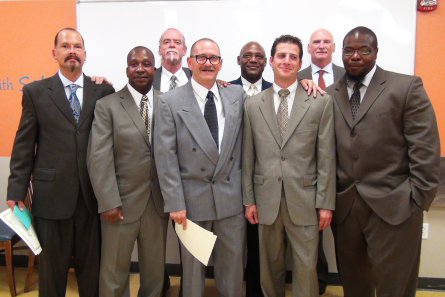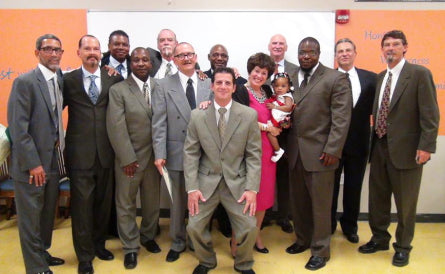




 "Slow is Smooth, Smooth is Fast"
Once the center of Virginia’s staid tobacco commerce, the Manchester district is now known for its rebirth. Turn-of-the-century warehouses are now residential lofts, art galleries and open workspaces. It is the backdrop of developers, creatives, and strategists in pursuit of iterative ways of business. Nestled along a sleepy stretch of forgotten industry, Americorps partner CARITAS seeks a pivot of a different sort.
Sparked by a Reagan-era volunteer movement, CARITAS is Central Virginia’s largest homeless services provider. In the decades since, the non-profit continues to remedy concurrent pressures that shape housing affordability, economic parity, and substance abuse.
Like its startup counterparts, CARITAS is socially responsible and vertically integrated. The scope of their work includes addiction recovery, housing relocation, job placement, and home furnishing. The momentum of one program influences and catalyzes the others.
The Healing Place, a yearlong recovery shelter for substance abuse, serves as a point of entry for many. CARITAS Shelter provides individual support to understand and mend the causes of homelessness. Above all, the program seeks and secures permanent housing for their visitors.
The “Works” segment motivates individuals with significant barriers to employment and includes many Healing Place alumni. The intensive, five-week course prepares its students for reentry into the workforce and offers resources throughout the first year of their search.
The success of the Healing Place, Shelter and Works programs revealed a common issue towards stability: proper home furnishing. The CARITAS Furniture Bank restores furniture slated for landfills and returns it to the community.
By identifying service gaps, the group expanded from emergency shelter provider to holistic resource.
Since the early days of “Works,” our team has played a small part of the program as ‘Dress for Success’ instructors. Every five weeks, a rotating crew ventures across the Mayo Bridge to discuss interview attire with a classroom of fifteen to twenty men. Their ages, races, and backgrounds vary. Their desire to be there does not.
Curious from the onset, every class asks a range of questions that boil down to context. As more companies shy away from business formal and encourage tech-casual, interview attire enters a grey zone in the minds of many. In a way, interview dress is similar to air travel - regardless of your ticket, if you dress for First Class, you may end up there.
As presenters, many first-timers nervously rely on our PowerPoint. The first few slides sound closer to monologues than talking points. While a visual script feels safe, it lacks the vulnerability that CARITAS encourages. As a junior member of the Ledbury team, teaching interview dress to a room of men twice my age brings a heightened self-awareness. No matter the start, five words continue to enliven the mood:
"Slow is Smooth, Smooth is Fast"
Once the center of Virginia’s staid tobacco commerce, the Manchester district is now known for its rebirth. Turn-of-the-century warehouses are now residential lofts, art galleries and open workspaces. It is the backdrop of developers, creatives, and strategists in pursuit of iterative ways of business. Nestled along a sleepy stretch of forgotten industry, Americorps partner CARITAS seeks a pivot of a different sort.
Sparked by a Reagan-era volunteer movement, CARITAS is Central Virginia’s largest homeless services provider. In the decades since, the non-profit continues to remedy concurrent pressures that shape housing affordability, economic parity, and substance abuse.
Like its startup counterparts, CARITAS is socially responsible and vertically integrated. The scope of their work includes addiction recovery, housing relocation, job placement, and home furnishing. The momentum of one program influences and catalyzes the others.
The Healing Place, a yearlong recovery shelter for substance abuse, serves as a point of entry for many. CARITAS Shelter provides individual support to understand and mend the causes of homelessness. Above all, the program seeks and secures permanent housing for their visitors.
The “Works” segment motivates individuals with significant barriers to employment and includes many Healing Place alumni. The intensive, five-week course prepares its students for reentry into the workforce and offers resources throughout the first year of their search.
The success of the Healing Place, Shelter and Works programs revealed a common issue towards stability: proper home furnishing. The CARITAS Furniture Bank restores furniture slated for landfills and returns it to the community.
By identifying service gaps, the group expanded from emergency shelter provider to holistic resource.
Since the early days of “Works,” our team has played a small part of the program as ‘Dress for Success’ instructors. Every five weeks, a rotating crew ventures across the Mayo Bridge to discuss interview attire with a classroom of fifteen to twenty men. Their ages, races, and backgrounds vary. Their desire to be there does not.
Curious from the onset, every class asks a range of questions that boil down to context. As more companies shy away from business formal and encourage tech-casual, interview attire enters a grey zone in the minds of many. In a way, interview dress is similar to air travel - regardless of your ticket, if you dress for First Class, you may end up there.
As presenters, many first-timers nervously rely on our PowerPoint. The first few slides sound closer to monologues than talking points. While a visual script feels safe, it lacks the vulnerability that CARITAS encourages. As a junior member of the Ledbury team, teaching interview dress to a room of men twice my age brings a heightened self-awareness. No matter the start, five words continue to enliven the mood:
“How to tie a tie."
A relief for our shy coworkers, the exercise gives everyone a moment to speak and collaborate. Some men learned to tie a tie for the first time and others wore them since their childhood. While we announce each step, the classmates help one another and bask in a newfound validation. As students finish their task, conversation shifts away from the technical and towards the anecdotal. We hear personal histories akin to a Humans of New York profile. One student relocated from Kentucky in search of sobriety and community. Another shared tales of a college-bound adolescence and risks taken in the name of early gratification. Other students remained soft-spoken but laughed along jovially. Soon after, they asked many questions about us, our company, and our shirts. They expressed a vulnerability that resonated throughout the room, one seldom found in the financial district of downtown. In an intersection close to scenes depicted in Richard Linklater’s latest introspective film, Boyhood, that hour allowed us a glimpse of their lives and, conversely, a glimpse of ours. But this experience is neither Humans of New York nor a Linklater work - this is someone’s day-to-day, their reality. An era of status anxiety and the prescriptions of Andrew Carnegie often emphasize a myopic focus on personal success and ignore social climate. Somehow, somewhere, something failed - but CARITAS doesn’t rest on the failure. CARITAS rebuilds self-identity through peer support and daily activities. They engage in critical reflection without scrutiny and foster community from disparate origins. From sobriety clinics to job placement, CARITAS values work over rhetoric. On its own, one-hour a week, every five weeks is hardly an accomplishment. It is one small piece in an intimate and intricate process. Volunteer work is less of a solo mission to save the world and more of a conversation to make sense of it. CARITAS’ holistic aim of personal and social change matches those changes in the Manchester area and echoes a shift in Kansas City and Detroit. The surrounding machinery, in various states of use and disuse, reflect the delicate work of recovery and community. In the way a seasoned mechanic diagnoses and repairs a starter engine, the staff, volunteers and participants at CARITAS take note of all possible solutions and pursue the best one. While software hackathons and Startup Weekends are often revered for their fun and innovative results, pivots also take place in less suspecting places.CARITAS Brief
CARITAS offers the only area shelter for single fathers and single women. With over 15,000 volunteers, the program houses entire families and strives to maintain same-school enrollment for children. Initiated in 2005, the Healing Place mixes family and volunteer support with the 12-Step recovery approaches of AA and NA. Since its start in 2011, the CARITAS Works program humbly boasts an 81% job placement rate. In the last four years, Furniture Bank volunteers and Healing Place graduates repaired and repurposed 180 tons of furniture. For more on CARITAS please visit their website. For volunteer opportunities in your area please see Americorps. -- Tavish










